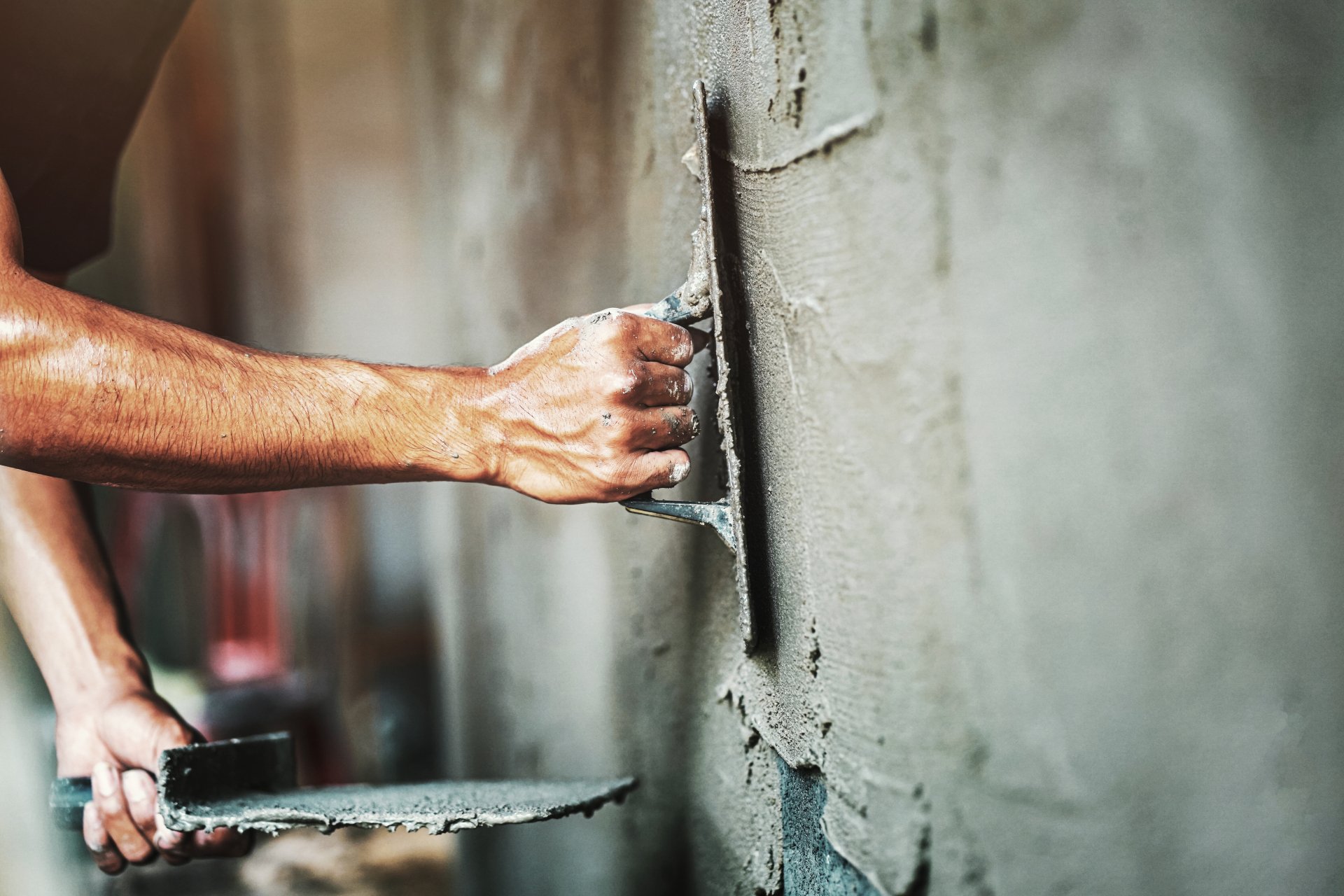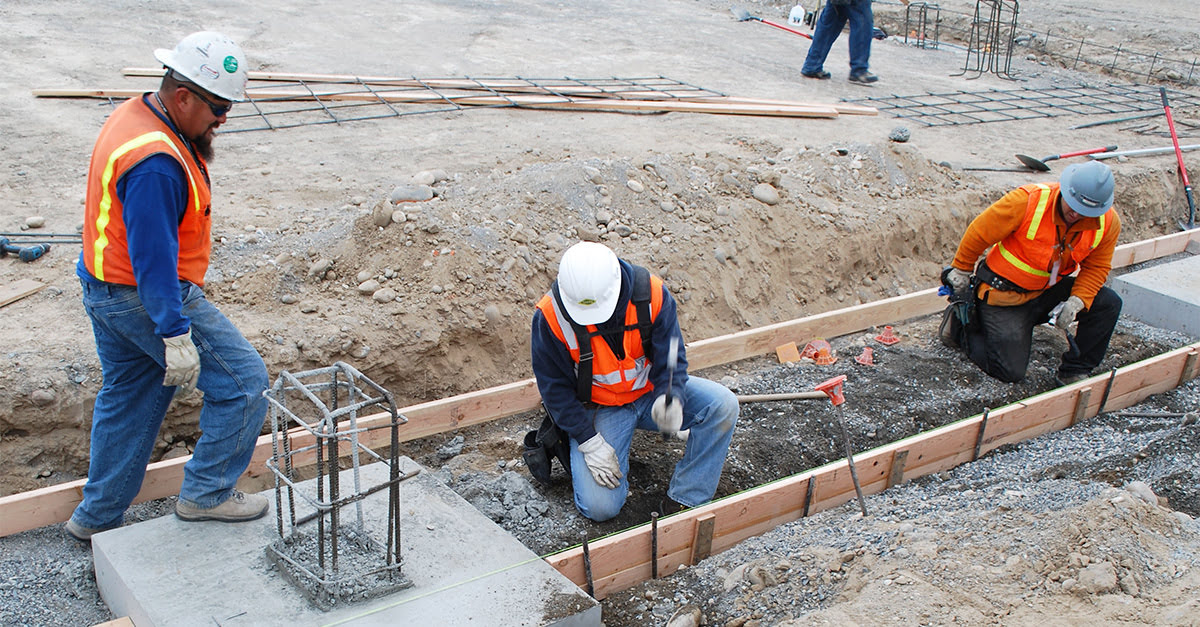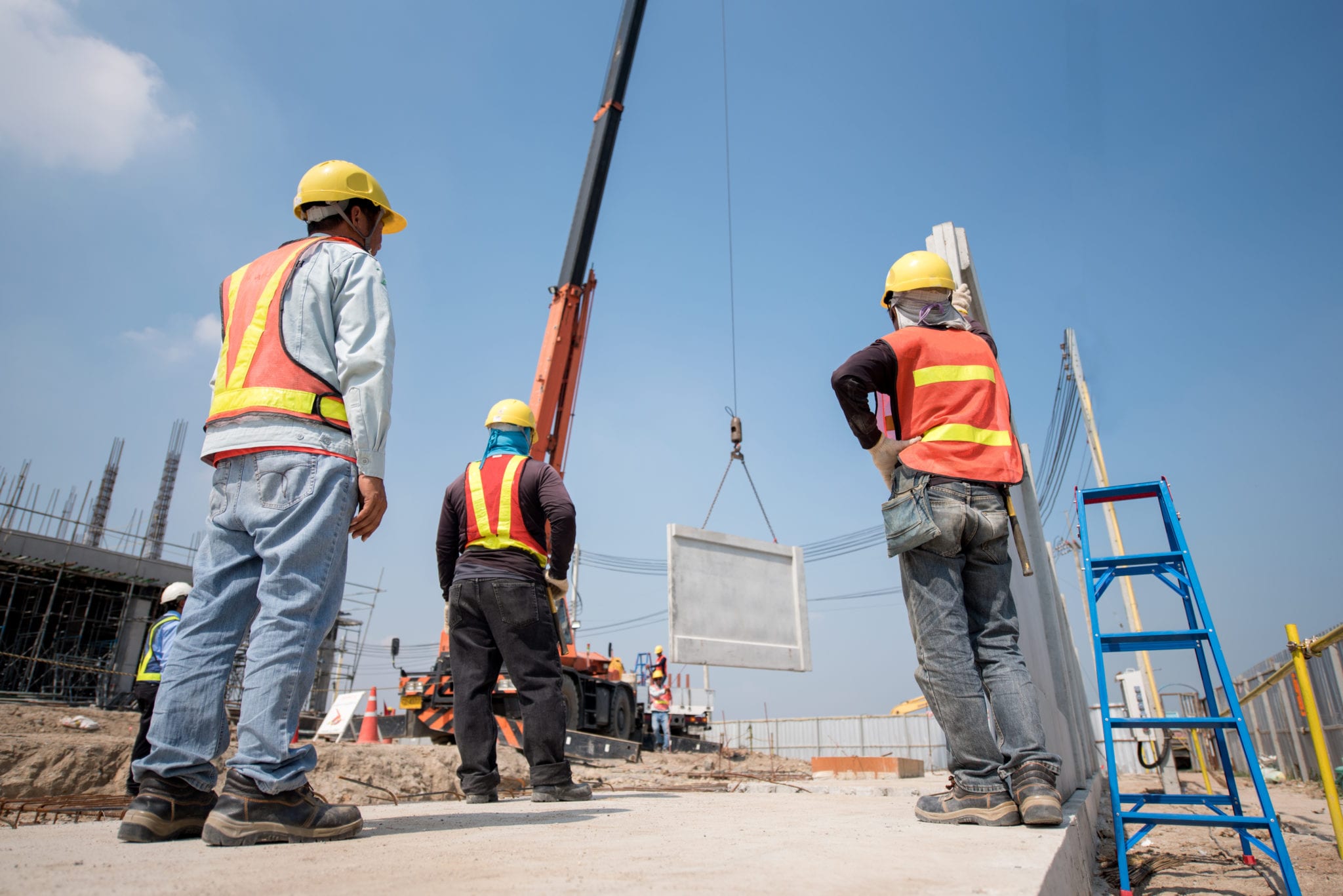Home>diy>Building & Construction>What Is Finish Work In Construction


Building & Construction
What Is Finish Work In Construction
Modified: January 19, 2024
Learn about finish work in building construction, including the tasks and skills involved. Discover the importance of high-quality finish work in creating a polished and functional space.
(Many of the links in this article redirect to a specific reviewed product. Your purchase of these products through affiliate links helps to generate commission for Storables.com, at no extra cost. Learn more)
Introduction
Building construction is a complex and multi-step process that involves various stages, each playing a crucial role in creating a functional and aesthetically pleasing structure. One of the final stages of construction is finish work, which encompasses the tasks and processes involved in adding the final touches to a building. Finish work is essential for transforming a construction project into a livable, visually appealing, and functional space.
In this article, we will explore the definition, importance, types, skills required, tools and materials used, process, common challenges, and tips for successful finish work in construction. Whether you are a homeowner looking to renovate your space or a construction professional aiming to enhance your knowledge, this article will provide valuable insights into the world of finish work in construction.
Finish work is the detailing and refinement process that occurs towards the end of a construction project. It involves tasks such as installing interior and exterior finishes, adding decorative elements, and ensuring the functionality and aesthetics of the space. Finish work requires precision and attention to detail to achieve the desired outcome.
This phase of construction is crucial as it significantly impacts the final appearance and functionality of the building. The quality of the finish work can greatly influence the overall value of the property and the satisfaction of its occupants.
Finish work in construction involves a wide range of activities, including but not limited to:
- Installing flooring materials such as hardwood, tile, carpet, or laminate
- Applying paint, wallpaper, or other decorative wall finishes
- Trimming windows, doors, and baseboards
- Installing kitchen and bathroom fixtures
- Creating custom cabinetry and millwork
- Electrical and plumbing fixtures
- Creating custom staircases and railings
- Installing exterior finishes like siding, trim, and roofing
As you can see, finish work encompasses a wide range of specialized tasks that require specific skills, expertise, and tools. In the following sections, we will delve deeper into each aspect of finish work in construction, providing a comprehensive understanding of this crucial phase in the building process.
Key Takeaways:
- Finish work in construction is a critical phase that adds the final aesthetic and functional touches to a building, significantly impacting its value, durability, and overall appeal.
- Successful finish work requires precision, clear communication, and a commitment to excellence. Coordinating various trades, using quality materials, and prioritizing customer satisfaction are essential for achieving remarkable results.
Read more: What Are MEP Works In Construction
Definition of Finish Work in Construction
Finish work in construction refers to the final phase of the building process, where the focus is on adding the finishing touches to a structure. It involves all the tasks and activities that enhance the aesthetics, functionality, and overall appearance of the building.
Finish work encompasses both interior and exterior elements, and it is the stage where attention to detail is of utmost importance. It involves the installation of various materials, finishes, and fixtures that create the desired look and feel of a space.
While the core construction focuses on structural elements like the foundation, walls, and roof, finish work adds the finer details that make a building complete. It is the stage where the vision for the project comes to life, and the space is transformed into a functional and visually pleasing environment.
The aim of finish work is to create an aesthetically appealing, durable, and functional space that meets the needs and preferences of the occupants. It is the stage where the building transitions from a construction site to a livable or usable space.
Finish work involves various trades and specialties, including carpentry, painting, electrical work, plumbing, and more. It requires skilled artisans, craftsmen, and tradespeople who have expertise in their respective areas to execute the tasks with precision and attention to detail.
Additionally, finish work also encompasses the installation of various fixtures and accessories that contribute to the overall functionality of the space. This includes elements such as lighting fixtures, cabinetry, countertops, flooring, trim, and more. These elements not only enhance the usability of the space but also elevate its visual appeal.
Overall, finish work is a critical phase in the construction process, as it brings all the disparate elements together and creates a cohesive and visually appealing space. It requires a careful balance of technical skills, creativity, and an eye for detail to ensure a successful outcome.
Importance of Finish Work in Construction
Finish work is a vital aspect of construction that holds immense importance for several reasons. Let’s explore the significance of finish work in construction:
- Aesthetics: Finish work is responsible for enhancing the visual appeal of a building. It includes elements such as paint, flooring, cabinetry, and decorative finishes that contribute to creating a pleasing and inviting atmosphere. A well-executed finish work can significantly enhance the overall value and marketability of a property.
- Functionality: Finish work ensures that a building is not just visually appealing but also functional. The installation of fixtures, such as plumbing and electrical elements, kitchen and bathroom equipment, and custom-designed cabinets, adds the necessary functionality and convenience to the space.
- Comfort: Finish work plays a crucial role in creating a comfortable and livable environment. Elements such as insulation, flooring materials, and temperature control systems contribute to creating a space that promotes comfort and a pleasant living or working experience.
- Durability: High-quality finish work ensures the durability and longevity of a building. Utilizing durable materials, such as sturdy flooring, long-lasting paint, and weather-resistant exterior finishes, helps protect the structure against wear and tear, and ensures it stands the test of time.
- Safety: Finish work also includes elements that contribute to the safety of the occupants. Proper installation of electrical wiring, plumbing systems, and security features play a crucial role in creating a safe living or working environment. Additionally, well-built staircases, handrails, and other safety measures are also part of the finish work.
- Value: The quality of finish work greatly influences the value of a property. A well-executed finish work can significantly increase the market value of the building, attracting potential buyers or tenants. It also sets a high standard for craftsmanship and quality, showcasing attention to detail and care in the construction process.
- Customer Satisfaction: Finish work is the stage where the vision for the building comes to life. Attention to detail, customization, and the incorporation of the customer’s preferences and requirements make a significant impact on customer satisfaction. A carefully crafted finish work ensures that the client’s expectations are met, leading to a positive experience and feedback.
Overall, finish work in construction plays a crucial role in creating not just a functional space, but also a visually appealing, durable, and comfortable environment. It is the stage where a construction project is transformed into a finished product, reflecting the talent, skills, and craftsmanship of the individuals involved in the process.
Types of Finish Work in Construction
Finish work in construction encompasses a wide range of specialized tasks and trades. Here are some of the main types of finish work commonly found in construction projects:
- Interior Finishes: This includes all the elements that contribute to the aesthetics and functionality of the interior space. It involves tasks such as installing flooring materials, such as hardwood, tile, carpet, or laminate; applying paint, wallpaper, or decorative wall finishes; installing trim around windows, doors, and baseboards; creating custom cabinetry and millwork; and installing electrical and plumbing fixtures.
- Exterior Finishes: Exterior finish work focuses on enhancing the appearance and functionality of the building’s exterior. It includes installing siding materials, such as vinyl, wood, or stone; applying exterior paint or finishes; adding trim and molding elements; installing roofing materials; and creating outdoor living spaces like decks or patios.
- Carpentry Work: Carpentry is a fundamental aspect of finish work. It involves tasks such as framing, trim work, installing doors and windows, building custom cabinetry, creating staircases and railings, and any other tasks that involve working with wood or wood-based materials.
- Painting and Wall Finishes: This type of finish work focuses on adding color, texture, and character to the walls. It includes preparing the surface, applying primers, and adding coats of paint. Additionally, it may involve techniques like faux finishes, wallpaper installation, or decorative wall treatments.
- Plumbing Fixtures: Finish work includes the installation of plumbing fixtures, such as sinks, faucets, toilets, showers, and bathtubs. This involves connecting the plumbing lines, ensuring proper water flow and drainage, and ensuring all fixtures are securely in place.
- Electrical Fixtures: This type of finish work involves the installation of electrical fixtures, including light fixtures, outlets, switches, and wiring connections. It ensures proper electrical functionality, safety, and convenience in the building.
- Flooring: Flooring finish work involves the installation of different flooring materials, such as hardwood, laminate, carpet, tile, or vinyl. It requires precise measurement, cutting, and installation techniques to achieve a seamless and visually appealing floor surface.
- HVAC Finish Work: This type of finish work focuses on the installation and integration of heating, ventilation, and air conditioning systems into the building. It includes installing ductwork, grilles, thermostats, and ensuring the proper functioning of the HVAC system for optimal comfort.
These are just a few examples of the types of finish work in construction. Each project may have unique requirements and may involve additional specialized finish work based on the specific needs and preferences of the building and its occupants.
It is important to note that different trades and professionals are responsible for each type of finish work, highlighting the importance of collaboration and coordination among various teams to ensure a successful outcome.
Skills Required for Finish Work in Construction
Finish work in construction requires a unique set of skills to ensure the successful completion of the project. Here are some of the key skills that are essential for professionals involved in finish work:
- Precision and Attention to Detail: Finish work demands a high level of precision and attention to detail. It involves intricate tasks such as measuring, cutting, and installing materials, as well as ensuring that all finishes are aligned and aesthetically pleasing. Professionals in finish work must have an eye for detail and the ability to execute tasks with accuracy.
- Carpentry Skills: One of the core skills required for finish work is carpentry. Carpenters must possess a solid understanding of woodworking techniques, including measuring, cutting, and joining materials. They must have expertise in installing trim, building cabinetry, and creating custom millwork.
- Knowledge of Building Materials and Finishes: Professionals involved in finish work should have a comprehensive knowledge of various materials and finishes used in construction. This includes understanding the properties and installation techniques of different flooring materials, paints, wallpapers, plumbing fixtures, electrical fixtures, and more. They must be familiar with industry standards and best practices for working with these materials.
- Communication and Collaboration: Effective communication and collaboration skills are essential for professionals in finish work. They must be able to communicate effectively with team members, clients, and other trades involved in the project. Clear communication ensures that everyone is on the same page and that the project progresses smoothly.
- Problem-Solving Abilities: Finish work often presents unforeseen challenges that require problem-solving skills. Professionals must be able to identify issues, develop creative solutions, and make adjustments as necessary to ensure a successful outcome. This may involve troubleshooting issues with materials, adapting to changes in design plans, or resolving conflicts between different finish elements.
- Time Management: Finish work requires efficient time management skills to meet project deadlines. Professionals must be able to prioritize tasks, coordinate with other trades, and ensure that work is completed in a timely manner without sacrificing quality or attention to detail.
- Customer Service: Professionals in finish work often interact directly with clients or homeowners. Having good customer service skills, including the ability to listen to client preferences, address concerns, and provide guidance, is essential for a positive experience and client satisfaction.
- Quality Assurance: Ensuring quality workmanship is also a vital skill in finish work. Professionals must have the ability to assess the quality of materials, finishes, and installations, and make necessary adjustments to achieve the desired outcome.
Developing and honing these skills through both practical experience and continuous learning is crucial for professionals involved in finish work. Possessing these skills not only ensures the successful execution of finish work but also contributes to client satisfaction and the overall success of the construction project.
Read more: What Is Punch Work In Construction
Tools and Materials Used in Finish Work
Finish work in construction requires the use of specialized tools and materials to achieve a high-quality and visually appealing outcome. Here are some of the common tools and materials used in finish work:
Tools:
- Measuring Tools: Tools such as tape measures, rulers, and levels are essential for accurately measuring and marking materials during the installation process.
- Cutting Tools: Various cutting tools, including saws (such as circular saws, miter saws, or jigsaws), utility knives, and chisels, are used to cut and shape materials like wood, laminate, tile, and molding.
- Fastening Tools: Tools such as nail guns, staplers, screwdrivers, and drills are used to securely fasten materials during installation.
- Finishing Tools: Tools like sanders, scrapers, and paintbrushes are used to prepare surfaces, remove imperfections, and apply finishes such as paint, stain, or varnish.
- Plumbing Tools: Plumbers may require tools like pipe cutters, wrenches, soldering irons, and pliers to install plumbing fixtures and ensure proper connections.
- Electrical Tools: Electricians use tools such as wire strippers, cable pullers, conduit benders, and multimeters to install and connect electrical fixtures.
- Safety Equipment: Personal protective equipment (PPE) such as goggles, gloves, masks, and ear protection is crucial to ensure the safety of workers during finish work.
Materials:
- Flooring Materials: Common flooring materials used in finish work include hardwood, laminate, carpet, tile, vinyl, and natural stone.
- Paint and Wall Finishes: Different types of paint, including latex, oil-based, and specialty finishes like enamel or epoxy, are used to add color and protection to walls. Wallpaper, decorative wall panels, and wall tiles are also used to create unique finishes.
- Trim and Molding: Various types of trim and molding, such as baseboards, crown molding, door and window casings, chair rails, and wainscoting, are used to add decorative accents and create a polished appearance.
- Cabinetry and Millwork: Custom cabinetry, shelves, built-in units, and decorative millwork are made from materials like wood, particleboard, or medium-density fiberboard (MDF) to add storage, functionality, and architectural details.
- Plumbing and Electrical Fixtures: Sinks, faucets, showers, bathtubs, toilets, light fixtures, outlets, switches, and other plumbing and electrical fixtures are essential components of finish work.
- Hardware and Accessories: Hardware such as door handles, hinges, drawer pulls, and knobs contribute to the overall aesthetics and functionality of cabinetry, doors, and furniture.
- Adhesives and Sealants: Adhesives, sealants, and grout are used to bond and seal materials, ensuring durability and proper installation.
It is essential for professionals in finish work to have access to appropriate tools and quality materials to ensure an efficient and successful project. Proper selection and utilization of these tools and materials contribute to achieving a high level of craftsmanship and the desired finish outcome in construction projects.
Process of Finish Work in Construction
The process of finish work in construction involves several steps and tasks that need to be executed with precision and attention to detail. While each project may have unique requirements, here is a general outline of the process involved in finish work:
Read more: What Is Mechanical Work In Construction
1. Preparing the Space:
The first step in finish work is preparing the space for installation. This includes removing any debris or construction materials left over from previous stages and ensuring the area is clean and ready for the finish work to begin. It may also involve preparing the surfaces by sanding, patching, or applying sealants.
2. Installing Flooring:
The installation of flooring materials is one of the significant tasks in finish work. This involves measuring the area, cutting the flooring materials to size, and securing them in place using appropriate adhesives, nails, or fasteners. Different flooring materials require specific installation techniques, so it is important to follow manufacturer guidelines and industry standards.
3. Adding Wall Finishes:
After the flooring is installed, the focus shifts to the walls. This step involves applying paint, wallpaper, or other decorative wall finishes. This includes preparing the walls by priming, applying multiple coats of paint, or installing wallpaper according to the desired design or pattern.
4. Installing Trim and Molding:
Trim and molding add a finishing touch to the space by creating architectural details and covering gaps or transitions between different surfaces. This step involves measuring and cutting trim pieces to fit precisely around windows, doors, baseboards, and other areas. The trim is then secured in place using nails, screws, or adhesives.
Read more: What Is Excavation Work In Construction
5. Installing Fixtures and Accessories:
The next step is the installation of fixtures and accessories, including plumbing fixtures, lighting fixtures, electrical outlets, switches, and hardware. This involves connecting plumbing and electrical lines, ensuring proper functionality and positioning, and securely fastening the fixtures and accessories in their designated places.
6. Customizing Cabinetry and Millwork:
If custom cabinetry or millwork is part of the project, this step involves the construction, installation, and finishing of these elements. Custom cabinets, shelves, and built-in units are constructed according to the design and specifications and then installed in the designated spaces. Finishing touches such as adding handles, knobs, and other hardware are also done in this stage.
7. Final Inspections and Touch-ups:
Once all the finish work is completed, a thorough inspection is conducted to ensure that everything is in order and meets the desired standards. Any necessary touch-ups or adjustments are made at this stage to ensure the overall quality and appearance of the finished space.
It is important to note that the process of finish work may vary depending on the complexity of the project, the specific requirements, and the trades involved. Collaboration and coordination among various professionals are key to a successful finish work process in construction.
Common Challenges in Finish Work
Finish work in construction can present a variety of challenges that need to be addressed effectively. Here are some of the common challenges encountered during finish work:
Read more: What Is Civil Work In Construction
1. Timing and Coordination:
Coordinating the schedules of different trades involved in finish work can be challenging. The timing of each task must be carefully planned to ensure a smooth workflow and avoid delays that can impact the overall project timeline.
2. Compatibility of Materials and Finishes:
Choosing materials and finishes that complement each other can be challenging. Ensuring compatibility in terms of color, texture, and overall design aesthetic is crucial to achieve a cohesive and visually pleasing look.
3. Precision and Measurement:
Finish work requires meticulous measurement and precision. Accurate measurements and cuts are essential for achieving seamless installations of materials like flooring, trim, and cabinetry. Any mistakes or inaccuracies can result in costly rework or compromised aesthetics.
4. Sealing and Finishing:
Properly sealing and finishing surfaces, especially in areas prone to moisture or heavy use, can be challenging. Ensuring proper waterproofing, preventing leaks, and maintaining a smooth and durable finish requires careful attention to detail and the use of high-quality materials and techniques.
Read more: What Is A Work Order In Construction
5. Design Changes or Modifications:
Design changes or modifications during the finish work stage can pose challenges, as they may require adjustments to already installed elements. Flexibility and effective communication between the design team, contractors, and trades are necessary to accommodate these changes without compromising the overall quality or timeline of the project.
6. Worker Fatigue and Attention to Detail:
Finish work often involves intricate and time-consuming tasks that require sustained focus and attention to detail. Worker fatigue over extended periods can impact the quality of the work being performed, leading to errors or compromised craftsmanship. Managing worker schedules and ensuring breaks and rest periods are essential to maintain the desired level of precision and quality.
7. Dealing with Imperfections:
No construction project is perfect, and there may be instances where imperfections or flaws are discovered during the finish work stage. Addressing and rectifying such issues requires problem-solving skills and the ability to find creative solutions while maintaining the overall project timeline and budget.
Overcoming these challenges in finish work requires effective planning, clear communication, skilled tradespeople, and the ability to adapt and problem-solve as needed. By proactively addressing these challenges, construction professionals can ensure successful and high-quality finish work for their projects.
Tips for Successful Finish Work in Construction
Finish work in construction requires careful planning, attention to detail, and skilled execution to achieve a successful outcome. Here are some tips to ensure the success of finish work:
Read more: What Is A Scope Of Work In Construction
1. Plan Ahead:
Thoroughly plan the finish work stage before beginning any installations. Create a detailed timeline, coordinate with other trades, and ensure all necessary materials and tools are readily available. A well-thought-out plan will help streamline the process and minimize delays.
2. Communicate Clearly:
Clear and effective communication is vital throughout the finish work stage. Establish open lines of communication with the entire project team, including tradespeople, designers, contractors, and clients. Regularly communicate progress, changes, or issues to avoid misunderstandings and facilitate smooth collaboration.
3. Follow Manufacturer Guidelines:
Adhere to manufacturer guidelines and best practices when installing materials and finishes. Whether it’s flooring, paint, or fixtures, following proper installation techniques and recommendations will ensure optimal results and durability.
4. Invest in Quality Tools and Materials:
Using high-quality tools, equipment, and materials is essential for delivering a top-notch finish. Investing in reliable tools and selecting durable materials will not only improve the quality of the work but also increase longevity and customer satisfaction.
5. Pay Attention to Detail:
Finish work requires precision and attention to detail. Take the time to measure accurately, make clean cuts, align finishes correctly, and ensure proper installation. Small details can make a significant difference in the overall appearance and functionality of the space.
6. Coordinate with Other Trades:
Effectively coordinate with other trades involved in the project to avoid conflicts and ensure a smooth workflow. Clear communication, timely scheduling, and collaborative problem-solving will contribute to a successful finish work process.
7. Regular Inspections and Quality Control:
Conduct regular inspections and quality control checks throughout the finish work stage. Address any issues promptly and ensure that the finished product meets the required standards. This will help identify and rectify any potential problems before completion.
8. Stay Flexible and Adapt:
Be prepared to adapt to changes, modifications, or unforeseen challenges during the finish work stage. Embrace flexibility and problem-solving skills to adjust plans or approaches when necessary. This will help you overcome obstacles and deliver a successful finish.
Read more: When Will I-85 Construction Be Finished
9. Take Breaks and Rest:
Finish work can be physically demanding and mentally taxing. Encourage breaks and rest periods to prevent worker fatigue. Well-rested workers will perform better, which contributes to higher-quality finish work.
10. Prioritize Customer Satisfaction:
Customer satisfaction is paramount in finish work. Regularly communicate with clients, listen to their feedback, and address any concerns or preferences they may have. Strive to exceed their expectations, ensuring they are delighted with the finished space.
By implementing these tips, construction professionals can enhance the quality, efficiency, and overall success of finish work in their projects. Attention to detail, effective communication, and a commitment to excellence will result in a remarkable finish that meets the needs and exceeds the expectations of clients.
Conclusion
Finish work in construction is a crucial stage that adds the final touches to a building, transforming it into a functional, visually appealing, and inviting space. It involves a wide range of specialized tasks, materials, and skills that require precision, attention to detail, and effective execution.
Throughout the finish work process, professionals must plan meticulously, communicate clearly, and collaborate effectively with other trades and team members. It is essential to follow manufacturer guidelines, use high-quality tools and materials, and prioritize customer satisfaction to ensure a successful outcome.
From installing flooring and adding wall finishes to customizing cabinetry and installing fixtures, each element of finish work contributes to the overall aesthetics, functionality, and value of the building. Careful coordination, adaptability to changes, and regular inspections help overcome challenges and deliver high-quality finish work.
By emphasizing skills such as precision, attention to detail, and effective communication, construction professionals can achieve remarkable results in finish work. From creating beautiful interior and exterior finishes to ensuring the functionality and durability of a space, every aspect of finish work contributes to the satisfaction of clients and residents.
Ultimately, successful finish work not only enhances the value and marketability of a property but also creates a space that people can truly call home or enjoy for years to come. It is the finishing touches that bring life, character, and comfort to a building, transforming it from a construction site into a place where memories are made.
So, whether you’re a homeowner embarking on a renovation project or a construction professional seeking to improve your skills, understanding the importance and intricacies of finish work in construction is fundamental. By implementing the tips and best practices outlined in this article, you can ensure that your finish work is executed with precision, craftsmanship, and a commitment to excellence.
After mastering the art of finish work in construction, why not apply your newfound skills to enhancing your home's exterior? Our next read provides a practical guide on how to install a window box, perfect for adding a touch of greenery and charm to your abode. This guide will walk you through the essential steps of window installation, ensuring your window boxes are set up for success and longevity. Don't miss out on this opportunity to beautify your living space with a simple yet impactful project!
Frequently Asked Questions about What Is Finish Work In Construction
Was this page helpful?
At Storables.com, we guarantee accurate and reliable information. Our content, validated by Expert Board Contributors, is crafted following stringent Editorial Policies. We're committed to providing you with well-researched, expert-backed insights for all your informational needs.








0 thoughts on “What Is Finish Work In Construction”